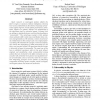Free Online Productivity Tools
i2Speak
i2Symbol
i2OCR
iTex2Img
iWeb2Print
iWeb2Shot
i2Type
iPdf2Split
iPdf2Merge
i2Bopomofo
i2Arabic
i2Style
i2Image
i2PDF
iLatex2Rtf
Sci2ools
115
click to vote
ATAL
2004
Springer
2004
Springer
Universality in Multi-Agent Systems
Much research in multi-agent systems reflects the field’s origins in classical artificial intelligence, showing how various refinements to the internal reasoning of individual agents improve overall system performance. Sometimes, aspects of a system’s behavior are independent of the algorithms used by individual agents. Drawing from an analogy in statistical physics, we term this phenomenon “universality.” The underlying concept is that systems whose elements differ widely may nevertheless have common emergent features. We develop a notion of universality in MAS based on the concept’s use in its original (physics) setting. We illustrate the concept in several examples, and discuss the implications of MAS universality for the theory and practice of MAS. We speculate that there exists a hierarchy of types of universality. The usual use of the term in statistical mechanics refers to the most refined, simplest, and quantitative, while commonalities among systems that are of inte...
Related Content
| Added | 30 Jun 2010 |
| Updated | 30 Jun 2010 |
| Type | Conference |
| Year | 2004 |
| Where | ATAL |
| Authors | H. Van Dyke Parunak, Sven Brueckner, Robert Savit |
Comments (0)

